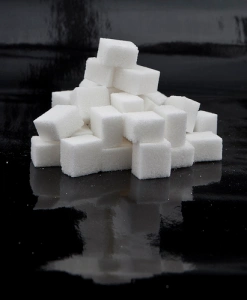In today’s fast-paced world, sugar has become a staple in many diets. From sugary drinks to processed snacks, it’s easy to consume more sugar than we realize. While sugar can provide a quick energy boost, excessive consumption can lead to a host of health problems. The World Health Organization (WHO) recommends that adults limit their daily sugar intake to less than 10% of their total energy intake, with further benefits seen at less than 5%. However, many people exceed these guidelines without even realizing it.

If you’ve been feeling off lately, it might be time to evaluate your sugar intake. Here are eight warning signs that you’re eating too much sugar:
1. Constant Cravings for Sweets
One of the most obvious signs that you’re eating too much sugar is an unrelenting craving for sweets. Sugar triggers the release of dopamine, the “feel-good” hormone, in your brain. Over time, your body becomes accustomed to this dopamine rush, leading to a cycle of cravings. If you find yourself reaching for candy, cookies, or sugary drinks throughout the day, it’s a clear indicator that your sugar intake is too high.
2. Frequent Energy Crashes
While sugar can give you a quick burst of energy, it’s often followed by a crash. This is because sugar causes a rapid spike in blood glucose levels, prompting your body to release insulin to bring those levels back down. The result? You feel tired, sluggish, and irritable. If you’re experiencing frequent energy crashes, especially after meals, it could be a sign that you’re consuming too much sugar.
3. Weight Gain
Excess sugar consumption is a major contributor to weight gain. Sugary foods and drinks are often high in calories but low in nutrients, leading to overeating. Additionally, sugar can interfere with hormones that regulate hunger, such as leptin and ghrelin, making it harder for you to feel full. If you’ve noticed the numbers on the scale creeping up, it might be time to cut back on sugar.
4. Skin Breakouts
Your skin can be a reflection of your diet, and too much sugar can wreak havoc on your complexion. High sugar intake can lead to inflammation and increase the production of sebum, an oily substance that clogs pores and causes acne. If you’re experiencing frequent breakouts or your skin looks dull and uneven, reducing your sugar intake could help.
5. Mood Swings and Irritability
Sugar doesn’t just affect your body—it can also impact your mental health. Consuming large amounts of sugar can cause fluctuations in blood sugar levels, leading to mood swings, irritability, and even anxiety. If you find yourself feeling unusually emotional or on edge, your sugar intake might be to blame.
6. Frequent Cavities and Dental Issues
Sugar is a leading cause of tooth decay. When you consume sugary foods and drinks, the bacteria in your mouth feed on the sugar and produce acid, which erodes tooth enamel. If you’ve been experiencing frequent cavities, gum disease, or other dental issues, it’s a strong sign that you’re eating too much sugar.
7. Increased Thirst and Frequent Urination
Excessive sugar consumption can lead to dehydration and increased thirst. When your blood sugar levels are high, your body tries to flush out the excess sugar through urine, leading to frequent trips to the bathroom. If you’re constantly thirsty and urinating more often than usual, it could be a sign that you’re consuming too much sugar.
8. Difficulty Concentrating
High sugar intake can impair cognitive function and make it difficult to concentrate. Studies have shown that diets high in sugar can negatively affect memory, attention, and learning. If you’re struggling to focus or feeling mentally foggy, reducing your sugar intake could help clear your mind.
How to Reduce Your Sugar Intake
If you’ve identified with one or more of these warning signs, it’s time to take action. Here are some practical tips to help you cut back on sugar:
- Read Food Labels: Many processed foods contain hidden sugars. Check the ingredient list for terms like high-fructose corn syrup, cane sugar, and other sweeteners.
- Choose Whole Foods: Opt for whole, unprocessed foods like fruits, vegetables, lean proteins, and whole grains.
- Limit Sugary Drinks: Replace sugary sodas and juices with water, herbal teas, or infused water.
- Satisfy Sweet Cravings Naturally: Reach for fresh fruit or a small piece of dark chocolate when you’re craving something sweet.
- Cook at Home: Preparing meals at home allows you to control the amount of sugar in your food.
Conclusion
While sugar can be a delicious treat, consuming too much of it can have serious consequences for your health. By recognizing the warning signs and taking steps to reduce your sugar intake, you can improve your overall well-being and reduce your risk of chronic diseases like obesity, diabetes, and heart disease. Remember, moderation is key—enjoy your favorite sweets occasionally, but make sure they don’t take over your diet. Your body (and mind) will thank you!
